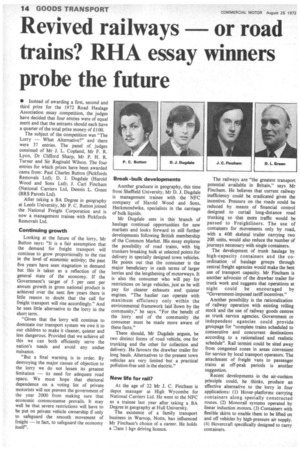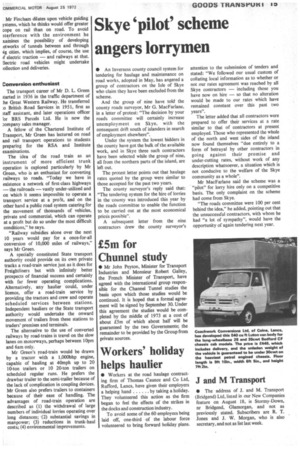Revived railways or road trains? RHA essay winners probe the future
Page 16

Page 17

If you've noticed an error in this article please click here to report it so we can fix it.
• Instead of awarding a first, second and third prize for the 1972 Road Haulage Association essay competition, the judges have decided that four entries were of equal merit and that the entrants should each have a quarter of the total prize money of £100.
The subject of the competition was "The Lorry — What Alternative?" and there were 37 entries. The panel of judges consisted of Mr J. L. Copland, Mr F. R. Lyon, Dr Clifford Sharp, Mr P. H. R. Turner and Sir Reginald Wilson. The four entries for which prizes have been awarded came from: Paul Charles Button (Pickfords Removals Ltd); D. J. Dugdale (Harold Wood and Sons Ltd); J. Carl Fincham (National Carriers Ltd, Dennis L. Green (BRS Parcels Ltd).
After taking a BA Degree in geography at Leeds University, Mr P. C. Button joined the National Freight Corporation and is now a management trainee with Pickfords Removals Ltd.
Continuing growth Looking at the future of the lorry, Mr Button says: "It is a fair assumption that the demand for freight transport will continue to grow proportionally to the rise in the level of economic activity; the past five years have seen stagnation in demand but this is taken as a reflection of the general state of the economy. If the Government's target of 5 per cent per annum growth in gross national product is achieved over the next few years there is little reason to doubt that the call for freight transport will rise accordingly." And he sees little alternative to the lorry in the short term.
"Given that the lorry will continue to dominate our transport system we owe it to our children to make it cleaner, quieter and less dangerous. Provided that we achieve all this we can both efficiently serve the nation's needs and avoid any undue nuisance.
"But a final warning is in order. By destroying the major causes of objection to the lorry we do not lessen its greatest limitation — its need for adequate road space. We must hope that electoral dependence on a voting list of private motorists will not prevent the government of the year 2000 from making sure that economic commonsense prevails. It may well be that severe restrictions will have to be put on private vehicle ownership if only to safeguard the smooth movement of freight — in fact, to safeguard the economy itself". Break-bulk deve oprnents Another graduate in geography, this time from Sheffield University, Mr D. J. Dugdale is management trainee with the NFC company of Harold Wood and Sons, Heckmondwike, specialists in the carriage of bulk liquids.
Mr Dugdale sees in this branch of haulage continual opportunities for new markets and looks forward to still further developments following British membership of the Common Market. His essay explores the possibility of road trains, with big trunkers breaking bulk at selected points for delivery in specially designed town vehicles. He points out that the consumer is the major beneficiary in cash terms of larger lorries and the lengthening of motorways. It is also the consumer who will pay for restrictions on large vehicles, just as he will pay for cleaner exhausts and quieter engines. "The haulier can operate with maximum efficiency only within the environmental framework laid 'down by the community," he says. "For the benefit of the lorry and of the community the consumer must be made more aware of these facts."
There should, Mr Dugdale argues, be two distinct forms of road vehicle, one for trunking and the other for collection and delivery. He favours the drawbar trailer for long hauls. Alternatives to the present town vehicles are very limited but a practical pollution-free unit is the electric."
New life for rail?
At the age of 22 Mr J. C. Fincham is depot manager at High Wycombe for National Carriers Ltd. He went to the NFC as a trainee last year after taking a BA Degree in geography at Hull University.
The existence of a family transport business in Warsop, Notts, has influenced Mr Fincham's choice of a career. He holds a :lass 1 hgv driving licence. The railways are "the greatest transport potential available in Britain," says Mr Fincham. He believes that current railway inefficiency could be eradicated given the incentive. Pressure on the roads could be reduced by means of financial control designed to curtail long-distance road trunking so that more traffic would be passed to Freightliners. The use of containers for movements only by road, with a 40ft skeletal trailer carrying two 20ft units, would also reduce the number of journeys necessary with single containers.
The development of trunk haulage by high-capacity containers and the coordination of haulage groups through central freight agencies would make the best use of transport capacity. Mr Fincham is another advocate of the drawbar trailer for trunk work and suggests that operations at night could be encouraged by "Government-imposed tariff incentives."
Another possibility is the rationalization of railway operation with existing rolling stock and the use of railway goods centres as trunk service agencies. Government or independent agencies could provide groupage for "complete trains scheduled to consecutive and concurrent destinations according to a rationalized and realistic schedule". Rail termini could be sited away from congested zones in areas convenient for service by local transport operators. The attachment of freight vans to passenger trains at off-peak periods is another suggestion.
Recent developments in the air-cushion principle could, he thinks, produce an effective alternative to the lorry in four applications: (1) Hover-platforms carrying containers along specially constructed routes. (2) Monorail systems operated by linear induction motors. (3) Containers with flexible skirts to enable them to be lifted on and off vehicles by high-pressure air supply. (4) Hovercraft specifically designed to carry containers.
Mr Fincham dilates upon vehicle guiding ystems, which he thinks would offer greater cope on rail than on road. To avoid iterference with the environment he xammes the possibility of developing etworks of tunnels between and through oig cities, which implies, of course, the use if electric traction — and railways at that. ilectric road vehicles might undertake :ollection and deliveries.
Conversion enthusiast The transport career of Mr D. L. Green ;tarted in 1936 in the traffic department of he Great Western Railway. He transferred :o British -Road Services in 1951, first as ;tall* assistant, and later operations officer br BRS Parcels Ltd. He is now the :ompany sales manager.
A fellow of the Chartered Institute of Transport, Mr Green has lectured on road and rail transport operations to students preparing for the RSA and Institute examinations.
The idea of the road train as an instrument of more efficient trunk operation is explored particularly by Mr Green, who is an enthusiast for converting railways to roads. "Today we have in existence a network of first-class highways — the railroads — vastly under-utilized and on which it seems impossible to operate a transport service at a proqt, and on the other hand a public road system catering for the movement of thousands of vehicles, private and commercial, which can operate at a profit but do so under the most difficult conditions," he says.
"Railway subsidies alone over the next 10 years would pay for a once-for-all conversion of 10,000 miles of railways," says Mr Green.
A specially constituted State transport authority could provide on its own private tracks a road-train service just as it does for Freightliners but with infinitely better prospects of financial success and certainly with far fewer operating complications. Alternatively, any haulier could, under licence, offer a road-train service by providing the tractors and crew and operate scheduled services between stations. Independent hauliers or the State transport authority would undertake the onward movement of trailers from these stations to traders' premises and terminals.
The alternative to the use of converted railways by road-trains is travel on the slow lanes on motorways, perhaps between lOpm and 6am only.
Mr Green's road-train would be drawn by a tractor with a 1,000bhp engine, capable of hauling at 40mph up to 20 10-ton trailers or 10 20-ton trailers on scheduled regular runs. He prefers the drawbar trailer to the semi-trailer because of the lack of complication in coupling devices. Mr Green also prefers trailers to containers because of their ease of handling. The advantages of road-train operation are described as (1) the withdrawal of large numbers of individual lorries operating over long distances; (2) substantial savings in manpower; (3) reductions in trunk-haul costs.; (4) environmental improvements.




















































































